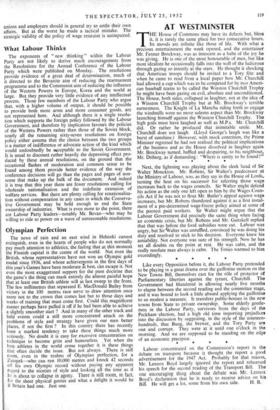Olympian Perfection
The news of rain and an east wind in Helsinki cannot extinguish, even in the hearts of people who do not normally pay much attention to athletics, the feeling that at this moment the Finnish capital is the centre of the world. Not even the British, whose representatives have not won an Olympic gold medal since 1936, and whose achievements in the first days of this year's Games have been moderate A best, 6.n escape it. Not even the most exaggerated support for the pure doctrine that the game's the thing can mask entirely the almost painful hope that at least one British athlete will at last sweep to the front. The few millimetres that separated E. MacDonald Bailey from victory in the 100 metres race serve to draw attention once more not to the crown that comes last but to those days and weeks of training that must come first. Could this magnificent runner perhaps have pulled it off if he had been able to achieve a slightly smoother start ? And in many of the other track and field events could a still more concentrated attack on the problems of style and strategy have given our men better places, if not the first ? In this country there has recently been a marked tendency to take these things much more seriously. No doubt it is easy for excessive concentration on technique to become grim and humourless. Yet when the best. athletes in the world come together it is these things that often decide the issue. But not always. There is still room, even in the realms of Olympian perfection, for a Zatopek—who can run 10,000 metres and knock 42 seconds off his own Olympic record without paying any apparent regard to the niceties of style and looking all the time as if he is about to collapse in agony. There is still room, in fact, for the sheer physical genius and what a delight it would be if Britain had one. Just one.


































 Previous page
Previous page